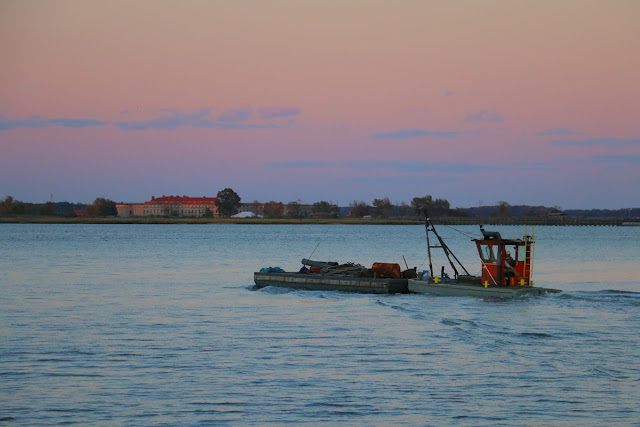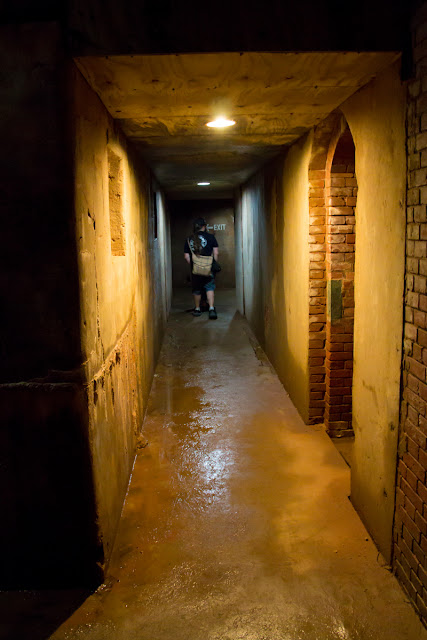I've been waiting forever to write this post! It's no secret that I visit a lot of historical sites, but I have to admit that right now, my favorite Civil War site is
in Delaware City, Delaware and it breaks my heart that historically minded people are surprised to hear that it's still there and not a long lost place they read about in books.The great news is not only is it still there but it's open to the public!
Pea Patch Island is a small, marshy island located on the Delaware River. It has been the site of 3 forts going back to the early 1800s due to its strategic position near the mouth of the Delaware Bay. The current fort, the bulk of which was finished in 1860, is a massive, pentagonal structure with looming 32 foot granite walls and a moat. Although originally built for defense of the ports of Wilmington and Philadelphia, the fort was repurposed as a POW for captured Confederates, political prisoners and Federal troops sentenced for crimes.
 |
| Ferry to Pea Patch Island |
When standing on the banks of the Delaware, the fort is menacing and appears not far off. Amidst the seagull caws you can hear the voices of onlookers claiming "I could swim that." The reality is that it's farther away than it looks. In modern times, you take a ferry to reach the island, in the 1860s the majority of men who thought thought they would take their chances trying to swim across, were swept under by the strong currents.
 |
| Docking at the Island. |
 |
| Tram once you land on Pea Patch. |
 |
| Birds flying to the island. |
In the early days, prisoners were kept inside the fort but as prisoners outnumbered guards and crowding became a problem, barracks were build outside the walls of the fort for the prisoners and only officers and Federal troops were kept in the fort for protection. Confederate prisoners taken after the Battle of Gettysburg were sent to Fort Delaware and prisoner numbers soared to 11,000 shortly after the battle.
In total, more than 40,000 Confederates were held on the island. According to the Fort Delaware Society, almost 3,000 Confederates died there as well as 39 civilian POWs and 109 Federal soldiers. Many of the deaths occurred during an outbreak of smallpox in 1863 and other illnesses. There were only 5 reports of drownings and 7 who died of gunshot wounds. While the living conditions were not as bad as some other POW camps at the time, the summers could be hot, muggy and mosquito infested and the sheer number on inmates on the tiny island made cramped conditions inevitable. Men were fed 3 light meals a day until 1864 when their rations were cut in retaliation for poor POW camp conditions in the Confederacy.


The island today would be unrecognizable to the men held there during the Civil War. It is currently a quiet nature preserve where you can see ibises, osprey and heron as the island is an important nesting area as more and more habitat is destroyed. The fort is also home to many bats who enjoy the dark cavernous walls as a hibernation destination. The bats of the fort are sadly infected with White-Nose Syndrome, a disease responsible for killing millions of bats in the last few years. You see many more animals than people and touring the island is much more like strolling along the beach than visiting a POW camp. Along with the wildlife you can take tours of the fort, see living historians doing daily 1860s tasks such as laundry and blacksmithing as well as specialized history tours and demonstrations. If you visit it is worth it to try and get a $5 "Behind the Scenes" tour if you can.
 |
| The officers quarters are nicely furnished. |
 |
| Recreation of the Prisoner's Barracks. |
 |
| Inside Recreation of Prisoner's Barracks |
 |
| Soldier's graffiti can be found throughout the fort. |
The island has its share of purported paranormal activity and lore. One of the stories I heard was of a drummer boy who tried to escape by hiding in a coffin but accidentally got buried alive. I looked into how plausible this story was as it didn't make sense to me that one could escape this way if the dead were buried on the island as some were. It turns out that many men were buried in New Jersey at
Finn's Point National Cemetery. In fact, the men who remained at the fort were reinterred at Finn's Point after the war in 1875. The spirit of this boy supposedly still wanders the fort and tugs on people's clothing.
Another story of escape involved a Florida man who was part of a Union practical joke only to turn the joke around on the pranksters. The Union soldiers thought it would be funny to watch some southerners to try to ice skate on the frozen Delaware River. The Florida man did some dramatic and entertaining falls until out of range of the guard's rifles, then skated right across the river to freedom. I likewise investigated whether this story could be true and the Delaware does indeed freeze over some years. Regardless if these two stories are true, there were thousands of escape attempts and 273 confirmed escapes.
1 Many of the failed escape attempts are used to explain the various apparitions, mysterious tugs and paranormal experiences at the fort.
 |
| The stars from inside the fort. |
 |
| Time lapse of visitors holding flashlights during the Ghost Tours. |
While ghost stories are at the tip of everyone's tongues at the fort, my research implies the fort has bigger problems. When reading about the re-internment of the soldiers buried on Pea Patch Island, I came across an odd report that stated "On opening the trenches & graves it was found that there had been interred 135 Union and 209 Confederates; and of these, 22 coffins though well preserved, were found to contain nothing."
 |
| A coincidence? I think not. |
Missing bodies, lots of bats? Clearly, the fort has vampires. I know I gawked when Abraham Lincoln: Vampire Hunter came out but maybe it's not such a stretch. :) All kidding aside, it really is a treat to see the fort at night and the fort gives night tours during the month of October. I hope everyone enjoyed the post and can get out to see the fort! It really is a great place to learn about history and nature.
For schedules, tickets and tour info:


























This is a really great historic site and they do an outstanding job of running it. I really enjoyed both my trips there. The tours of the areas the bats stay are pretty cool, and seeing some of the big guns and the places like the officers quarters are just awesome.
ReplyDeleteYes. I really liked the bar tours.
Deletebat*
DeleteMy Dad remembered visiting the fort a few times in the 1960s when Grandpa took him to see it...he said it was pretty much an overgrown ruin with trees growing on the ramparts, barely recognizable as a fort. It actually looks much better now.I had a chance to spend the night there once. but it was just before the 150th Manassas...99 degrees 100% humidity at midnight. Thanks but no thanks.
ReplyDeleteWhen I was in the 2nd Delaware regiment we had our special taunts for battle....like "Hey I hear it's maggot macaroni night at Fort Delaware!"